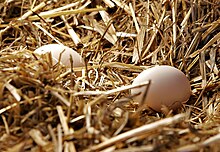hage
Danish[edit]

Pronunciation[edit]
Etymology 1[edit]
Noun[edit]
hage c (singular definite hagen, plural indefinite hager)
- chin (bottom of a face)
Inflection[edit]
Etymology 2[edit]
From Old Norse haki, from Proto-Germanic *hakô.
Noun[edit]
hage c (singular definite hagen, plural indefinite hager)
- a hook, barb, calk
- (figuratively) a complication or hurdle
Inflection[edit]
Verb[edit]
hage (imperative hag, infinitive at hage, present tense hager, past tense hagede, perfect tense er/har haget)
- Only used in hage sig fast (“to hang onto, to latch onto, to quibble over”)
Japanese[edit]
Romanization[edit]
hage
Middle Dutch[edit]
Etymology[edit]
From Old Dutch *hago, from Proto-West Germanic *hagō.
Noun[edit]
hāge m or f
Inflection[edit]
This noun needs an inflection-table template.
Alternative forms[edit]
Derived terms[edit]
Descendants[edit]
- Dutch: haag
Further reading[edit]
- “haghe”, in Vroegmiddelnederlands Woordenboek, 2000
- Verwijs, E., Verdam, J. (1885–1929) “hage”, in Middelnederlandsch Woordenboek, The Hague: Martinus Nijhoff, →ISBN
Norwegian Bokmål[edit]
Etymology[edit]
From Old Norse hagi, from Proto-Germanic *hagô, from Proto-Indo-European *kagʰom.
Noun[edit]
hage m (definite singular hagen, indefinite plural hager, definite plural hagene)
- a garden (decorative piece of land outside with flowers and plants)
- Edens hage ― the Garden of Eden
Derived terms[edit]
References[edit]
- “hage” in The Bokmål Dictionary.
Norwegian Nynorsk[edit]
Etymology[edit]
From Old Norse hagi, from Proto-Germanic *hagô, from Proto-Indo-European *kagʰom.
Pronunciation[edit]
Noun[edit]
hage m (definite singular hagen, indefinite plural hagar, definite plural hagane)
- a garden (An outdoor area containing plants, usually plants grown for food or ornamental purposes.)
- Edens hage / hagen i Eden ― the Garden of Eden
Declension[edit]
Derived terms[edit]
References[edit]
- “hage” in The Nynorsk Dictionary.
Swedish[edit]

Etymology[edit]
From Old Norse hagi, from Proto-Germanic *hagô, from Proto-Indo-European *kagʰom.
Pronunciation[edit]
Noun[edit]
hage c
- an enclosed pasture; a pasture, a pen, a paddock
- (Can we date this quote?), traditional (lyrics and music), “Uti vår hage [(Out) in our pasture]”:
- Uti vår hage, där växa [plural form, växer in contemporary Swedish] blå bär. Kom hjärtansfröjd. Vill du mig något så träffas vi där. Kom liljor och akvileja. Kom rosor och saliveja. Kom ljuva krusmynta. Kom hjärtansfröjd.
- Out in our pasture, blue berries grow. Come lemon balm ["heart's delight," more commonly citronmeliss]. If you need me for something ["If you want me something" – expresses wanting to talk to someone regarding something], we will meet there. Come lilies and columbine [dated, more commonly akleja]. Come roses and sage [rare, usually salvia]. Come sweet curly mint. Come lemon balm.
- a playpen
- a hopscotch grid
- hoppa hage (idiomatic, and also the name of the game itself)
- play hopscotch
Declension[edit]
| Declension of hage | ||||
|---|---|---|---|---|
| Singular | Plural | |||
| Indefinite | Definite | Indefinite | Definite | |
| Nominative | hage | hagen | hagar | hagarna |
| Genitive | hages | hagens | hagars | hagarnas |
Synonyms[edit]
- (dialect, obsolete) have
Derived terms[edit]
References[edit]
- hage in Svensk ordbok (SO)
- hage in Svenska Akademiens ordlista (SAOL)
- hage in Svenska Akademiens ordbok (SAOB)
Zazaki[edit]

Alternative forms[edit]
Noun[edit]
hage
- Danish terms with IPA pronunciation
- Rhymes:Danish/aːə
- Rhymes:Danish/aːə/2 syllables
- Danish terms inherited from Old Norse
- Danish terms derived from Old Norse
- Danish lemmas
- Danish nouns
- Danish common-gender nouns
- Danish terms inherited from Proto-Germanic
- Danish terms derived from Proto-Germanic
- Danish verbs
- Japanese non-lemma forms
- Japanese romanizations
- Middle Dutch terms derived from Proto-Germanic
- Middle Dutch terms inherited from Proto-Germanic
- Middle Dutch terms derived from Proto-Indo-European
- Middle Dutch terms inherited from Proto-Indo-European
- Middle Dutch terms inherited from Old Dutch
- Middle Dutch terms derived from Old Dutch
- Middle Dutch terms inherited from Proto-West Germanic
- Middle Dutch terms derived from Proto-West Germanic
- Middle Dutch lemmas
- Middle Dutch nouns
- Middle Dutch masculine nouns
- Middle Dutch feminine nouns
- Middle Dutch nouns with multiple genders
- Norwegian Bokmål terms inherited from Old Norse
- Norwegian Bokmål terms derived from Old Norse
- Norwegian Bokmål terms inherited from Proto-Germanic
- Norwegian Bokmål terms derived from Proto-Germanic
- Norwegian Bokmål terms inherited from Proto-Indo-European
- Norwegian Bokmål terms derived from Proto-Indo-European
- Norwegian Bokmål lemmas
- Norwegian Bokmål nouns
- Norwegian Bokmål masculine nouns
- Norwegian Bokmål terms with usage examples
- Norwegian Nynorsk terms derived from Old Norse
- Norwegian Nynorsk terms inherited from Proto-Germanic
- Norwegian Nynorsk terms derived from Proto-Germanic
- Norwegian Nynorsk terms inherited from Proto-Indo-European
- Norwegian Nynorsk terms derived from Proto-Indo-European
- Norwegian Nynorsk terms with IPA pronunciation
- Norwegian Nynorsk lemmas
- Norwegian Nynorsk nouns
- Norwegian Nynorsk masculine nouns
- Norwegian Nynorsk terms with usage examples
- Norwegian Nynorsk masculine an-stem nouns
- Swedish terms derived from Old Norse
- Swedish terms inherited from Proto-Germanic
- Swedish terms derived from Proto-Germanic
- Swedish terms inherited from Proto-Indo-European
- Swedish terms derived from Proto-Indo-European
- Swedish terms with IPA pronunciation
- Swedish terms with audio links
- Swedish lemmas
- Swedish nouns
- Swedish common-gender nouns
- Swedish terms with quotations
- Swedish terms with usage examples
- Zazaki lemmas
- Zazaki nouns
